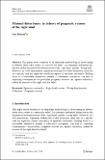Files in this item
Minimal disturbance : in defence of pragmatic reasons of the right kind
Item metadata
| dc.contributor.author | Bastian, Lisa | |
| dc.date.accessioned | 2019-12-17T15:30:14Z | |
| dc.date.available | 2019-12-17T15:30:14Z | |
| dc.date.issued | 2019-12-09 | |
| dc.identifier | 263919915 | |
| dc.identifier | 5dcbd266-5368-47b6-ba86-d2448dbb9d7e | |
| dc.identifier | 85076731429 | |
| dc.identifier | 000566143400001 | |
| dc.identifier.citation | Bastian , L 2019 , ' Minimal disturbance : in defence of pragmatic reasons of the right kind ' , Philosophical Studies , vol. First Online . https://doi.org/10.1007/s11098-019-01385-y | en |
| dc.identifier.issn | 0031-8116 | |
| dc.identifier.uri | https://hdl.handle.net/10023/19151 | |
| dc.description | Funding: UK Arts and Humanities Research Council 1796583. | en |
| dc.description.abstract | This paper draws attention to an important methodological shortcoming in debates about what counts as a reason for belief. An extremely influential distinction in this literature is between reasons of the ‘right kind’ and the ‘wrong kind’. However, as I will demonstrate, arguments making use of this distinction often rely on a specific (and not explicitly stated) conception of epistemic rationality. Shifting focus to a reasonable alternative, namely a coherentist conception, can lead to surprising consequences—in particular, pragmatic reasons can, against orthodoxy, indeed be reasons of the right kind for belief. | |
| dc.format.extent | 22 | |
| dc.format.extent | 340373 | |
| dc.language.iso | eng | |
| dc.relation.ispartof | Philosophical Studies | en |
| dc.subject | Epistemic rationality | en |
| dc.subject | Right-kind reasons | en |
| dc.subject | Wrong-kind reasons | en |
| dc.subject | Coherence | en |
| dc.subject | Pragmatic reasons | en |
| dc.subject | B Philosophy (General) | en |
| dc.subject | T-NDAS | en |
| dc.subject.lcc | B1 | en |
| dc.title | Minimal disturbance : in defence of pragmatic reasons of the right kind | en |
| dc.type | Journal article | en |
| dc.contributor.institution | University of St Andrews. Philosophy | en |
| dc.identifier.doi | https://doi.org/10.1007/s11098-019-01385-y | |
| dc.description.status | Peer reviewed | en |
This item appears in the following Collection(s)
Items in the St Andrews Research Repository are protected by copyright, with all rights reserved, unless otherwise indicated.

